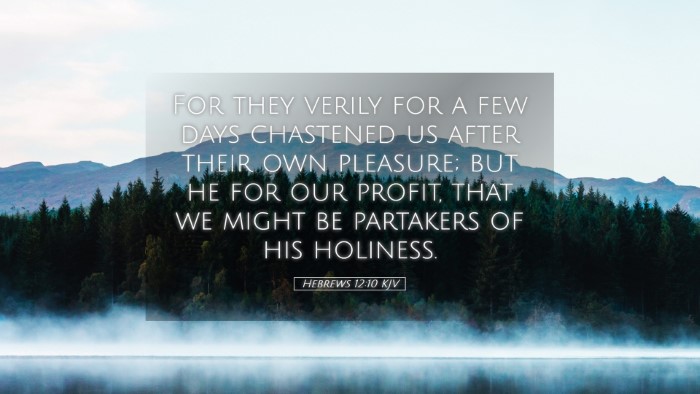Commentary on Hebrews 12:10
Hebrews 12:10 states: "For they verily for a few days chastened us after their own pleasure; but he for our profit, that we might be partakers of his holiness."
Introduction
This verse is part of a larger discourse regarding the discipline of God, comparing earthly fathers' discipline with that of the divine Father. It highlights the purpose and benefits of God’s chastening, which serves both to correct and to promote holiness in the life of believers.
Insights from Matthew Henry
Matthew Henry emphasizes that human fathers discipline their children based on their own whims or motivations, which may not always align with the child's best interest. In contrast, God’s discipline is profoundly rooted in His love and desire to cultivate holiness within us.
- Purpose of Discipline: Henry notes that divine chastening, though it may seem painful, ultimately aims at our spiritual benefit. It leads to growth and strengthens our character.
- Partaking in Holiness: He reflects on the profound privilege of being partakers of God’s holiness, which is the true end of His disciplinary actions. This participation speaks to a deeper relationship with God.
Insights from Albert Barnes
Albert Barnes provides a theological lens through which to view this verse. He articulates that earthly fathers administer discipline limited by their understanding, often failing to see the broader implications of their actions.
- Contrast with Divine Discipline: Barnes elaborates that God's chastening is never arbitrary but is administered for our ultimate good, refining our spirits and character.
- Holiness as a Goal: He underscores that becoming partakers of God's holiness is both a present and future reality for believers, establishing a foundation for moral living and spiritual maturity.
Insights from Adam Clarke
Adam Clarke offers a deeper exploration of the nuances of God's chastening. He notes that while the temporary pain of discipline may be disconcerting, it has a significant, long-term purpose that cannot be overlooked.
- Nature of Chastening: Clarke argues that the sufferings experienced are not haphazard but serve as instruments in the hands of God for refining His people, much like a goldsmith refines gold.
- Community of Holiness: Furthermore, he emphasizes that through discipline, believers are shaped to reflect God’s character, preparing them for a community of holiness where they can glorify God effectively.
Theological Reflections
This passage invites us to reflect deeply on the nature of divine discipline and its implications for our relationship with God. It poses critical theological questions about love, discipline, and the ultimate purpose behind God’s actions in our lives.
- Understanding Divine Love: The verse reminds us that God's love manifests through His desire to see us grow in holiness, challenging us to consider our responses to His discipline.
- Call to Reflect Holiness: As partakers of His holiness, we are called not just to receive this gift but also to reflect it within our community and the world, shaping our actions and interactions.
Conclusion
Hebrews 12:10 serves as a potent reminder of God’s redemptive purpose in discipline, contrasting human frailty with divine perfection. For pastors, students, theologians, and Bible scholars, this passage elucidates the complexity of God's care for His people through chastening aimed at deeper communion and holiness. It urges a response of submission and an understanding of the overarching love God has for His children.


